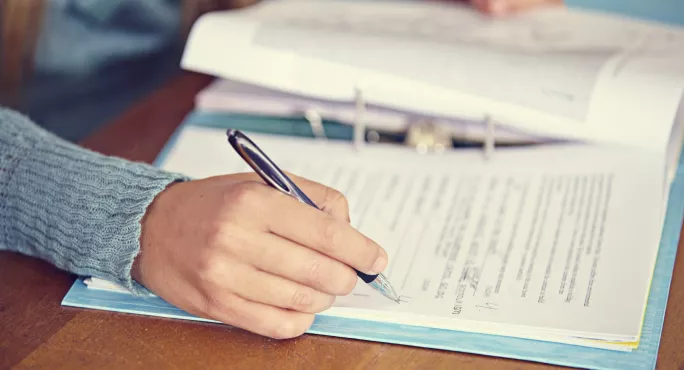I’m a head of sixth form, and a marker for the International Baccalaureate. I know that there’s a lot of anticipation around A-level results day this year. But, to be honest, I’m feeling calm and excited about it. In fact, the IB process has made me feel more confident about A-level results day.
I’m calm because, in terms of the process, I feel like it’s been rigorous; it’s been robust.
I feel confident in terms of the way we’ve handled the situation - that our students will get the results they’ve worked for.
We’ve always had a good record of achievement. Our results have always been quite favourable. Between 40 and 50 per cent of our students go on to Russell Group universities. And, this year, we’ve had offers from Oxford. So that’s why I feel quite confident.
Optimism about A-level results
All our predictions have been based on evidence. It’s not a question of personal relationships, or anything like that. Year on year, our results have been good. So I feel like this year we may even get our best results ever.
I know that teachers have been questioning the experiences of markers, but I’ve been marking for five years for the IB. I can say with confidence that the process has been rigorous. It’s been as robust as it’s always been - if not more.
People who aren’t involved make all these assumptions about the process. But I’m proud to have been a part of it all.
I know what it’s like to look at a teacher’s marking, and think, “Oof, you’re a bit generous here.” But that’s exactly why we have moderation and lead examiners. If there have been any discrepancies or questions, we’ve always gone to the lead examiner, and asked them to moderate. It’s not just one person having a say on what grades should be.
In fact, I feel like the board was a lot more conscientious this year about ensuring that every examiner really, sincerely felt confident. The conversations that I had with the lead examiners were extensive. They made sure that everyone felt confident about what they were about to do.
Not plucked from the sky
Before Covid, parents trusted teachers to deliver the content, and we trusted the students to perform well in the exams. Now that’s all shifted: now exam boards have to trust the teachers to make sure that everything is evidence-based, and teachers have to trust the exam boards to follow through.
Obviously, there has been some apprehension among students. But we get that every year, regardless of Covid.
They have asked questions. They’re trying to double-check the process of how their grades will come about. We’ve explained to them that it’s based on evidence. We haven’t plucked them from the sky; it’s not about their relationships with their teachers. It’s about previous coursework assessments - it’s all provable.
When our students do their mocks, we get them into the mindset that they need to do everything they can right now, because this will be what we’ll be referring to, when we make their predictions. Those students who are suddenly going to pull their socks up before an exam will do it before the mocks. That’s what mocks are there for: to help those kinds of students.
Don’t assume the worst
The pandemic shouldn’t totally delete what they’ve achieved over the past year and a half. Their journey to higher education is still something to be proud of.
It’s easy to focus on the negatives, and the challenging times. But I’m quite a positive person by nature. I just want to bring it back a little bit, and look at the bigger picture. The best way to do that is to make sure that students see these past couple of months as a season: a part of their learning. It’s not the entire picture of what they’ve done.
I’m trying to make sure that they understand the process, rather than just assuming the worst. The students are aware of our record of achievement, and that’s gone a long way towards pacifying their fears, and allowing them not to assume the worst.
Of course, it’s challenging for them. But it’s about life skills as well. It’s about trying to get them to be adaptable, resilient. We’ve been talking about these skills for years, and this has really shown them why it’s useful.
I’ve always told them that life isn’t straightforward: there are always going to be challenges and hurdles. It’s about doing what’s within their power to do. Even if there are setbacks, not every circumstance is going to be a negative one. You can use these things as opportunities.
Enuma Afulukwe is head of sixth form at Rivers Academy, in West London, which is part of the Aspirations Academies Trust

